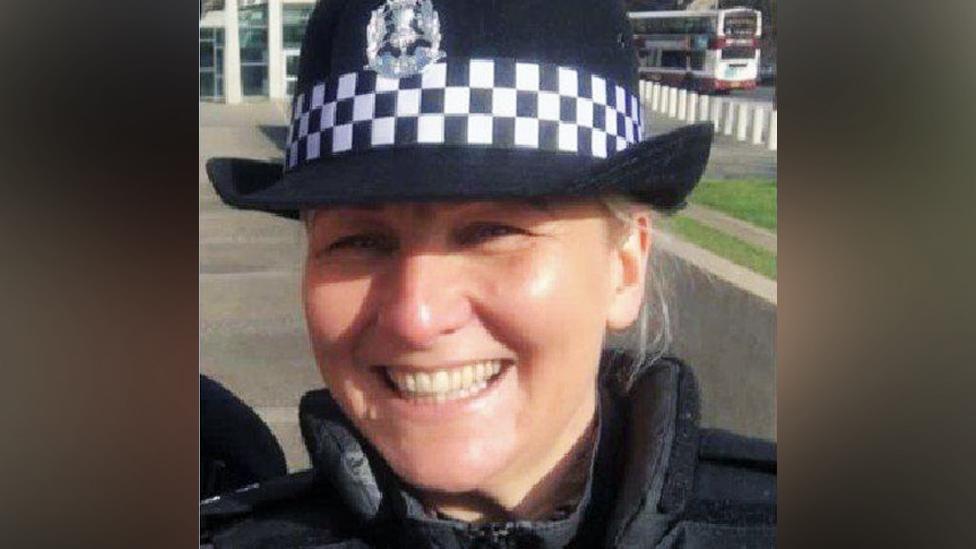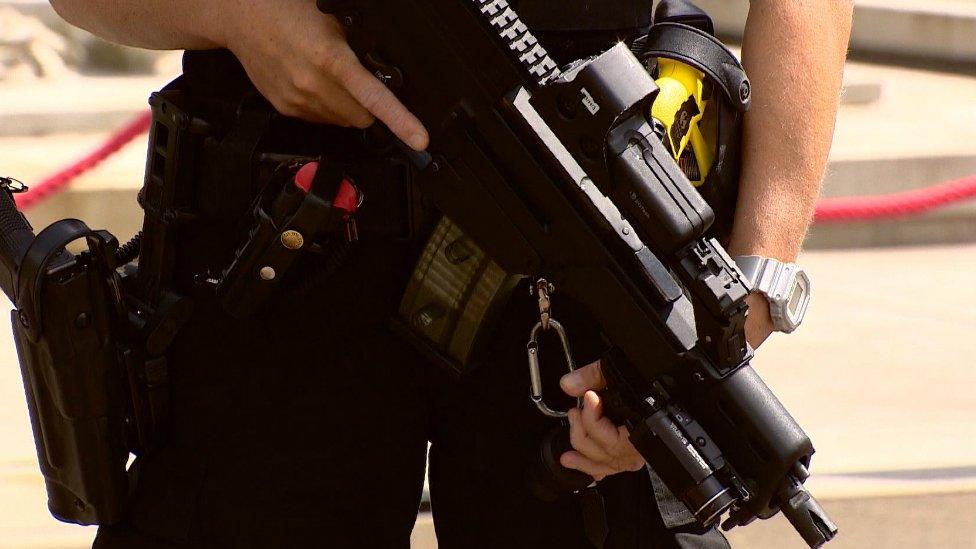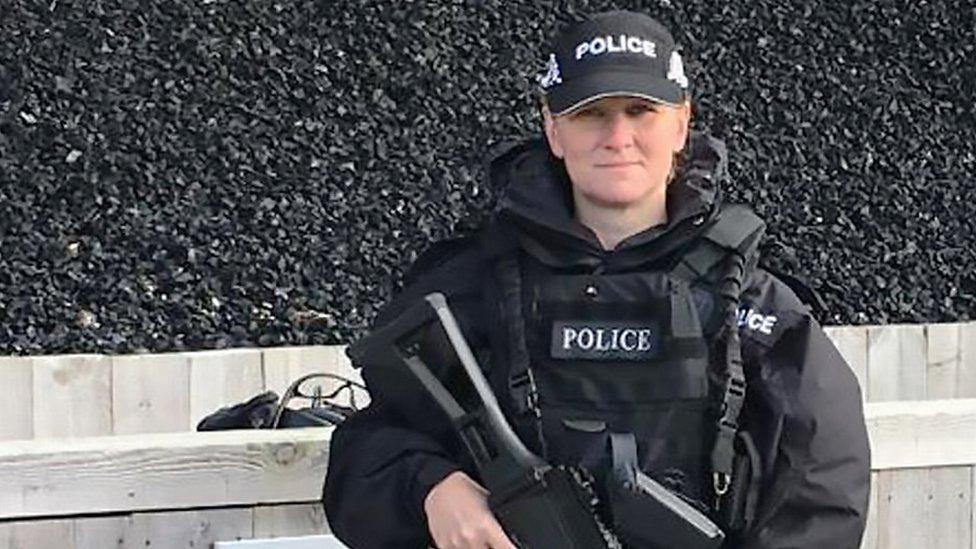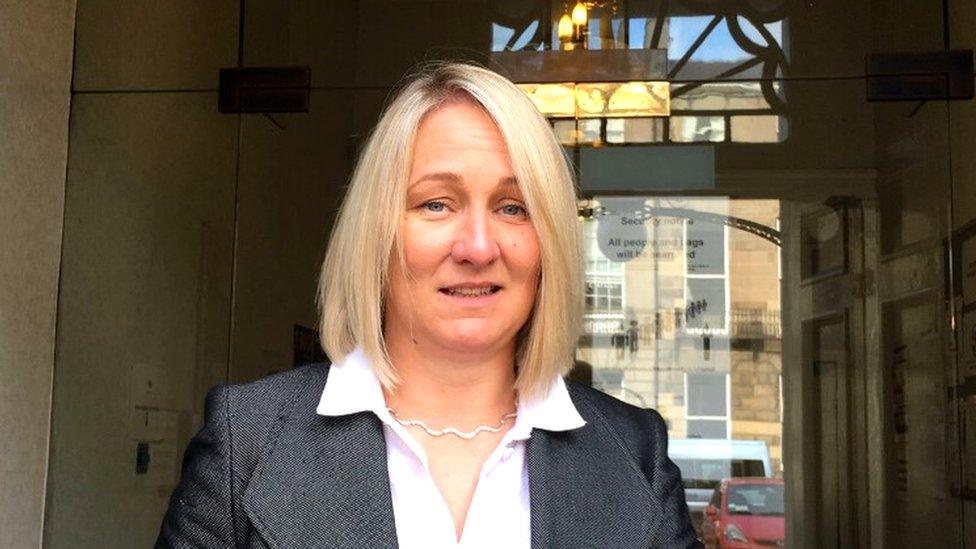Police put me through 'absolute hell' says ex-officer
- Published
"I'd love to say I could forgive, but I can't" - former firearms officer on armed policing unit culture
An ex-firearms officer says she has been through "absolute hell" after an employment tribunal found evidence of a sexist "boys' club" culture in a Police Scotland armed response unit.
Rhona Malone's case was brought after a senior officer said two female armed officers should not be deployed together.
Her victimisation claims succeeded but a sex discrimination claim was dismissed.
Police Scotland has apologised.
It said its response at the time was "nowhere near good enough" and will address the issues raised by the ruling as a "matter of urgency".
Ms Malone told BBC Scotland "I've finally got justice, the acknowledgement I've been looking for."
She continued: "I didn't want to leave my job, there was no reason for this, it was completely unnecessary.
"I didn't need to go to court for any of this, but they made it so difficult. They put me and my family through absolute hell and torture, for years I was in limbo.
"As a police officer I stood up for people's rights, I expected the same in return."

Ms Malone was a police officer for seven years before qualifying as a firearms officer
Before the tribunal action commenced Ms Malone says Police Scotland offered her a pay-out on the condition she signed a non-disclosure agreement (NDA) - a legal document to stop her speaking about what happened and from assisting any colleagues in a similar situation.
Ms Malone refused as she says this "went against everything I believed in".
She added: "Because they [Police Scotland] have hidden behind NDAs, not dealing with the problem or dealing with the culture, this happened to me and it took my career away from me.
"It took my mental health away from me, I loved my job."
In its judgement, external, the employment tribunal accepted evidence that there was an "absolute boys' club culture" within the armed response unit in Edinburgh where Ms Malone worked.
It also found Sgt Rachel Coates, a former colleague of Ms Malone, was told by a senior firearms instructor that women should not become authorised firearms officer "because they menstruated and that affected their temperament".
When Sgt Coates asked if female authorised firearms officer could wear trousers and a top, rather than a one-piece, so it would be easier to go to the toilet, the firearms instructor swore at her.


The outcome of Rhona Malone's case is a serious and embarrassing blow for the reputation of Scotland's national force, at a time when sexism within UK policing is under fierce scrutiny.
The employment tribunal has said she was a respected and committed officer with an exemplary record before she joined the firearms unit in Edinburgh in October 2016. Less than four years later she had retired from the force on the grounds of ill-health.
After hearing from serving and former officers, the tribunal has accepted that the culture within the armed response unit was an "absolute boys club." That description came from a man - a former police sergeant.
It's accepted that a chief firearms instructor said female officers shouldn't be equipped with guns because menstruation would affect their temperament.
The tribunal decided that the evidence of the inspector whose email began all of this was not credible, and that Rhona Malone was victimised through a bungled grievance handling process, much of which involved a newly appointed female area commander.
Police Scotland has more than 22,000 police officers and support staff who on a daily basis perform a vital role, protecting the public and bringing criminals to justice.
The number of individuals involved in this one case was very small and major organisations lose employment tribunals from time to time, but Police Scotland is not just any old organisation and a firearms unit is not just any old department.
In its response to the tribunal's findings, the force has made no attempt to dispute any of this or play it down. Instead it said it's worked hard to improve standards and knows "there is still much to do."
Last year former Lord Advocate Dame Elish Angiolini QC raised concerns about discrimination within Police Scotland. At the time, the Chief Constable Iain Livingstone said he was committed to improving public confidence in the force.
That task won't be any easier after this case.


Rhona Malone said the tribunal case "wasn't about embarrassing Police Scotland" but rather achieving "accountability and acknowledgement"
The tribunal also found that Ms Malone was an "entirely credible and reliable witness", but the evidence of her former superior, Insp Keith Warhurst, was "contradictory, confusing and ultimately incredible".
Insp Warhurst sent an email in January 2018 saying two female firearms officers should not be deployed together when there were sufficient male staff on duty.
In the email he said it made "more sense from a search, balance of testosterone perspective".
But the tribunal found that the instruction was not implemented, as staff were told it did not represent the views of senior management. As a result of this, it dismissed the direct discrimination claim.
'Self-preservation'
Ms Malone said she felt "every department shut the door on me" when she tried to deal with the issue when she was still employed by the force.
She added: "My reputation was really affected, I was being targeted because I was standing up for myself and they couldn't deal with that - all they wanted to do was protect their self interest."
Ms Malone claimed there was a culture of "self preservation" among senior officers in the force rather than getting to the root cause of any issues.
Assistant Chief Constable Mark Williams said: "It is clear the culture in armed policing in 2017 and 2018 was unacceptable. Since then, we have worked hard to improve standards but we know there is much still to do.
"Sexism, misogyny and discrimination of any kind is deplorable. It has no place in society and no place in policing. Everyone in policing has a responsibility to lead change so we better reflect, represent and serve our communities and improve the experience of officers and staff.
"As an organisation, our response when a dedicated female officer raised legitimate concerns was nowhere near good enough. I apologise unreservedly to Ms Malone for those failings and for the significant impact they had on her."
Assistant Chief Constable Williams said the force would address the issues raised by the ruling as a "matter of urgency."
Related topics
- Published19 October 2018

- Published6 October 2021

- Published20 November 2020
